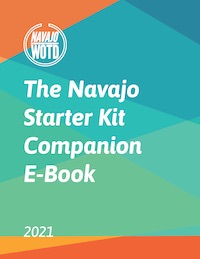Késhmish
Christmas Day
ke$h mihsh
In the great collection of Navajo-ized words, Késhmish is probably the only holiday that gets to keep some of its American vocal quality.
Késhmish is Navajo for Christmas. If you remember back to the Navajo alphabet post, there is no “CH” (only “CH’-“) because “K” handles the job. There is also no direct “R” alphabet value. So lots of things had to change before it became speakable for many Navajos.
Késhmish will often refer to the time surrounding Christmas only – descriptive in the same sense that a milepost marks distance on a road. So one may use Késhmish in regular speech, without implying that he or she is of any particular faith or belief.
